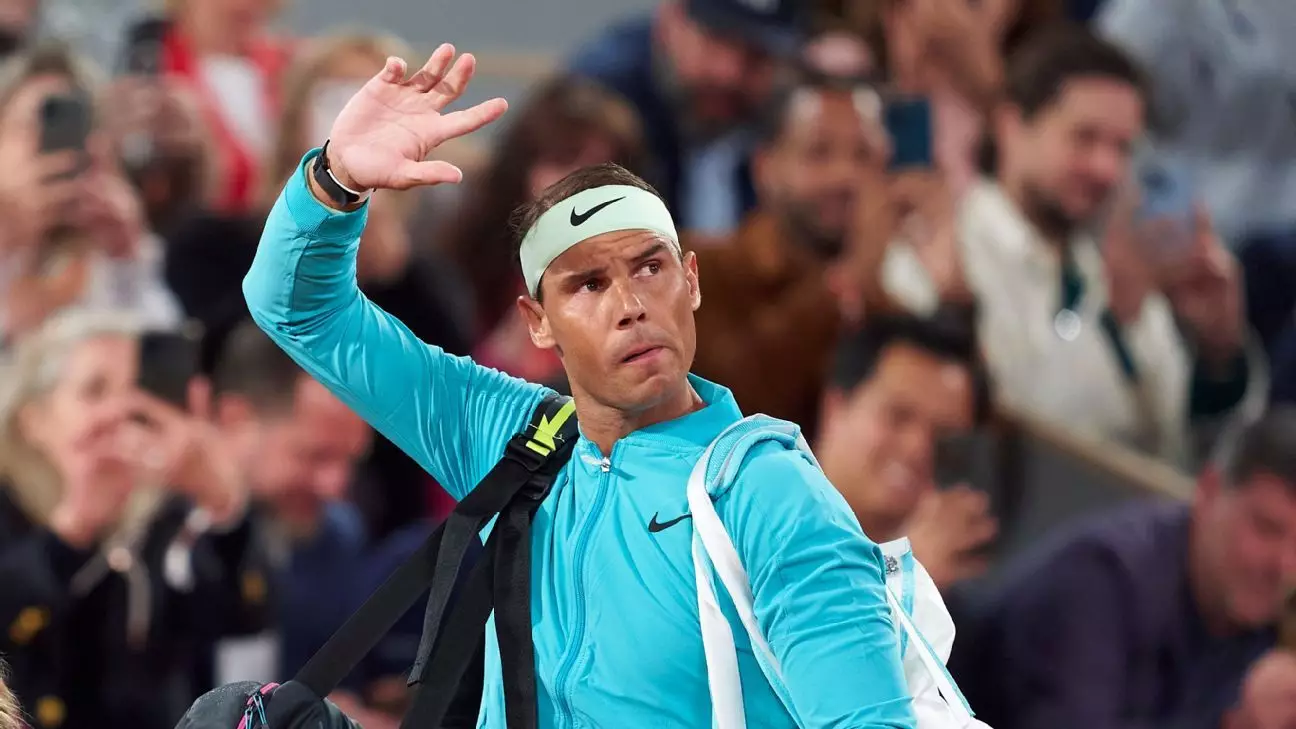The French Open is set to kick off a historic tribute next month to one of tennis’s greatest icons, Rafael Nadal, as organizers prepare to honor the 14-time champion who graced the red clay with unparalleled excellence. Emotions will undoubtedly run high as this year’s tournament marks a poignant occasion—just one year after Nadal faced an uncharacteristic first-round exit against Alexander Zverev, a shocking defeat that left many wondering if they had witnessed the end of an era. The subsequent announcement of Nadal’s retirement following his involvement in the Davis Cup last November solidified that sentiment, yet fans from around the world still hold hope as they await this grand celebration of his illustrious career.
The heart of Paris, with its sprawling courts and passionate crowds, has hosted Nadal’s magic for nearly two decades. Indeed, no player has etched their name into the annals of this tournament like Nadal has. Tournament director Amélie Mauresmo’s resolute statement, “Rafa made history at Roland Garros, and his 14 titles will perhaps remain unequaled,” embodies the sentiment of millions who witnessed his dominance. The plan to honor Nadal during the day session on May 25th on the premier Court Philippe Chatrier promises to be a memorable occasion, designed not only to celebrate Nadal’s past achievements but also to inspire future generations.
A Legacy Unmatched
As part of the tribute, Nadal will be acknowledged through various means—the unveiling of a statue commemorates his on-court excellence, while his voice will resonate in the official French Open trailer. The tennis world often forgets that sheer numbers do not fully capture the essence of a player’s legacy; Nadal’s influence transcends statistics. His relentless dedication to the sport, characterized by formidable physicality and sportsmanship, has inspired countless young athletes globally. Even as we reflect on his career, the conversation frequently turns to the question—will anyone achieve the level of success he has reached at Roland Garros? It is a discourse that may linger for generations.
Plans for additional recognitions also include tributes to Mary Pierce, the 2000 women’s champion, and Richard Gasquet, who plans to retire post-tournament. This nuanced approach to honor multiple facets of tennis history signifies a communal respect for the sport’s rich tapestry. It’s essential to remember legends of the past while simultaneously welcoming the newcomers ready to build their legacies.
The Future of the French Open
In addition to honoring Nadal, the French Open is taking strides in maintaining its relevance within the modern sports landscape. The announcement of a prize pool totaling 56.352 million euros reflects a commitment to compensating athletes for their dedication and hard work. This increase of over 5% from the previous year signals that the French Open is aware of the changing dynamics in professional sports and intends to remain competitive with other Grand Slams. While some might argue that financial aspects should not overshadow the sport’s integrity, it is crucial to recognize that athletes’ welfare should always be a priority.
However, as the French Tennis Federation reaffirms its commitment to traditional line judging, the conversation surrounding the adoption of electronic line calling invites intrigue. Tennis is evolving in unprecedented ways, and although Roland Garros stands firm in upholding its traditions, the question remains: how can it find a balance between nostalgia and innovation? While technological advancements, such as electronic line calling, have become prevalent in other Grand Slams, the decision to retain human oversight may both endear and alienate fans in equal measure.
Building Community through Tennis
In a strategic move to capitalize on the buzz generated by the upcoming 2024 Paris Olympics, organizers are setting up a fan zone replete with giant screens, enabling thousands of admirers to partake in the excitement surrounding the event. This initiative is emblematic of how sports can unite fans in fervor—not just within the confines of stadium seats but across communal spaces. Such initiatives breathe life into the energy of major tournaments, creating an atmosphere that extends beyond court lines and into the hearts of cities themselves.
Looking ahead, the French Open’s efforts to foster a sense of community will be essential in reinforcing the tournament’s significance in global tennis culture. As we prepare to honor Nadal and relish the thrill of the tournament, it becomes imperative to celebrate not just individual excellence but also the shared love of the game that connects us all.


Leave a Reply